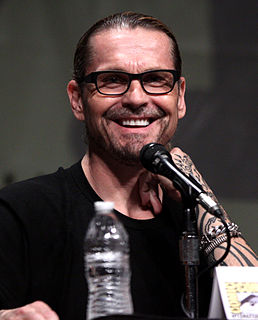A Quote by J. G. Ballard
Fiction is a branch of neurology: the scenarios of nerve and blood vessels are the written mythologies of memory and desire.
Related Quotes
Observation by means of the microscope will reveal more wonderful things than those viewed in regard to mere structure and connection: for while the heart is still beating the contrary (i.e., in opposite directions in the different vessels) movement of the blood is observed in the vessels-though with difficulty-so that the circulation of the blood is clearly exposed.
Memory is like fiction; or else it's fiction that's like memory. This really came home to me once I started writing fiction, that memory seemd a kind of fiction, or vice versa. Either way, no matter how hard you try to put everything neatly into shape, the context wanders this way and that, until finally the context isn't even there anymore... Warm with life, hopeless unstable.
Chris [Kattan] and Will [Ferrell] and I all went out – I don’t want to say where, because it’s a famous restaurant and it’s Italian-owned and I don’t want any trouble. But I ended up throwing up all night from food poisoning. All the blood vessels in my eyes were broken, and the blood vessels in my face. I did not sleep. I walked into the audition and the makeup person said, ‘Oh my God, what happened to you?’ I looked like I was in a car accident.
As you may know, my motto is: "All memory is fiction." It could just as easily be: "All fiction is memory." Unpacked, these two statements defy the ease of logic, but offer some really important truths about narrative art, at the very least, and about memory. So I would say that all art is personal.
Karma is experience, and experience creates memory, and memory creates imagination and desire, and desire creates karma again. If I buy a cup of coffee, that's karma. I now have that memory that might give me the potential desire for having cappuccino, and I walk into Starbucks, and there's karma all over again.
to look back on one's life is to experience the capriciousness of memory. ... the past is not static. It can be relived only in memory, and memory is a device for forgetting as well as remembering. It, too, is not immutable. It rediscovers, reinvents, reorganizes. Like a passage of prose it can be revised and repunctuated. To that extent, every autobiography is a work of fiction and every work of fiction an autobiography.





































